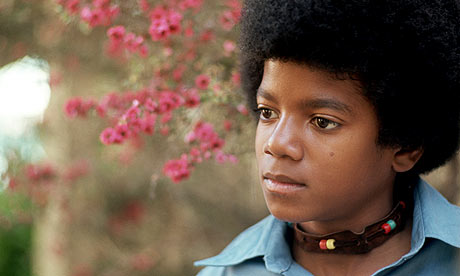Germaine Greer's beautiful tribute:
'Like Orpheus, Michael Jackson was destroyed by his fans'
Young Michael Jackson stands in a garden. Photograph: Henry Diltz/Corbis
Another beautiful boy is gone, wiped out in an instant. Michael Jackson, unable to cross the threshhold into manhood, has died at 50, still a boy, coquettish, fantasy-ridden, horribly vulnerable, unable to take control of his life.
His sudden death is a strange kind of victory. He had managed to prevent his ageing and even his growing up. There was no beard upon his chin; his voice was a childish treble. Instead of entering middle age and letting himself be chained to earth, he has floated away like a wisp, annihilated on the brink of a 50-date concert tour that I for one was dreading.
It's all very well for Madonna to be cranking out tour after tour. As she could neither dance nor sing at 25 no one is going to mind that she still can't do it at 50. But to see Michael Jackson faking it would have been heartbreaking. Among the hearts that would have broken is Jackson's own. It has snapped before the debacle. He has been spared.
According to Madonna "the world has lost one of the greats". We haven't lost Michael Jackson, because he cannot disappear. His three great albums will last as long as electronic media continues to exist, while the dross is forgotten.
The era of his astonishing creativity ended 20 years ago; most of what has happened since has been embarrassment. Jackson's kind of transcendental creativity is typical of very young men; it seldom survives into manhood, when the glory fades into the light of common day. Jackson succeeded in prolonging his brilliant boyhood into his thirties, but eventually he ran out of inspiration.
His art had been fuelled by the vernacular culture of the streets but it was many years since he had been able to run with the kids on the block. As his imagination faltered and grew dim, the fending off of maturity became desperate, demented and pointless. The struggle against ageing turned into self-harming and self-mutilation.
Ever since Dionysos danced ahead of his horde of bloody-footed maenads across the rocky highlands of prehistoric Greece, dance and song have been the province of boys. Like Orpheus, Jackson was destroyed by his fans, whose adulation and adoration prevented his living in any kind of normal society. The creativity ebbed away day by day. He became a parody of himself. It is time now to forget all that and salute the miraculous boy who will triumph over death as Dionysos did, becoming immortal through his art.
Nowhere will his contribution be more obvious and his influence more strongly felt than in the world of dance. No choreographer of the last 30 years has been unaware of Jackson's achievement. He rewrote the vocabulary of dance for everyone, from kids competing in talent shows to the royal ballets of Europe.
If the dance establishment did not often acknowledge his influence it was because there was no need. His shapes, his moves were everywhere.
Nijinsky and Nureyev also died young. They, too, were transcendent dancing boys, but they chose to interpret the choreography supplied to them by others.
By contrast Michael Jackson's art was astonishingly innovative. No one could dance like him, until he showed them how, and then they were never as good as he was. His concept of the dance was utterly 20th century, extravagantly multi-dimensional, and not in the least middle class.
Nijinsky may have been the greatest Spectre de la Rose, Nureyev the greatest Corsair, but these two candles pale in the light of Jackson's blazing star. The surprise is not that we have lost him, but that we ever had him at all.
http://www.guardian.co.uk/music/2009/jun/26/michael-jackson-death-in-la

